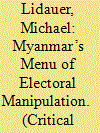|
|
|
Sort Order |
|
|
|
Items / Page
|
|
|
|
|
|
|
| Srl | Item |
| 1 |
ID:
183819


|
|
|
|
|
| Summary/Abstract |
The 2015 general elections were considered a hallmark of Myanmar's transition from an authoritarian regime towards a new form of government. However, the elections did not take place in all parts of the country, and significant portions of the population were excluded from the vote, including voters in areas of contested sovereignty, those who experienced displacement by conflict, and the Rohingya. Against the background of the regulatory framework for elections in Myanmar and its electoral system, this article looks first into a particular understudied element of the electoral process—the cancellation or postponement of elections in areas affected by conflict, which is little understood by voters, election administrators, and outside observers. Second, the article examines the conditions necessary for internally displaced persons (IDPs) to participate in elections. Third, the article recapitulates the gradual legal disenfranchisement of voters and candidates who self-identified as Rohingya, which preceded their mass exodus to Bangladesh in 2017. While in 2015 all these processes of exclusion were arguably of lesser priority for the election administration, which facilitated the first credible Myanmar election in decades, they have not altered significantly since and will affect the electoral participation of disadvantaged communities again in the future.
|
|
|
|
|
|
|
|
|
|
|
|
|
|
|
|
| 2 |
ID:
193134


|
|
|
|
|
| Summary/Abstract |
One decade after Myanmar’s military regime organized non-competitive elections that unexpectedly commenced a period of political reforms, the military leadership upended this transitional period with a coup based on a narrative of electoral fraud. Cancelling the November 2020 election results which had confirmed the voters’ preferences for civilian rule, the military has begun organizing fresh elections while concurrently leading a war against the population. Building on Schedler (2002) and the debate on authoritarian elections, this article analyses the military’s contemporary menu of electoral manipulation as a comprehensive set of intertwined strategies. It integrates the analysis of various technical elements of the authoritarian electoral process that are often only looked at in isolation. The article deconstructs the military’s election-related narratives as self-legitimation in a region where authoritarian elections are the norm. Despite considerable efforts to forge conditions in their favor and create an aura of legitimacy, however, Myanmar’s military does not appear very imaginative in this undertaking, but employs a retrograde toolbox in a brutal manner. Whether this strategy is successful will not depend on the authoritarian leaders’ skills alone, but also on recognition from domestic, regional and international audiences which the junta’s performance seeks to achieve.
|
|
|
|
|
|
|
|
|
|
|
|
|
|
|
|
|
|
|
|
|